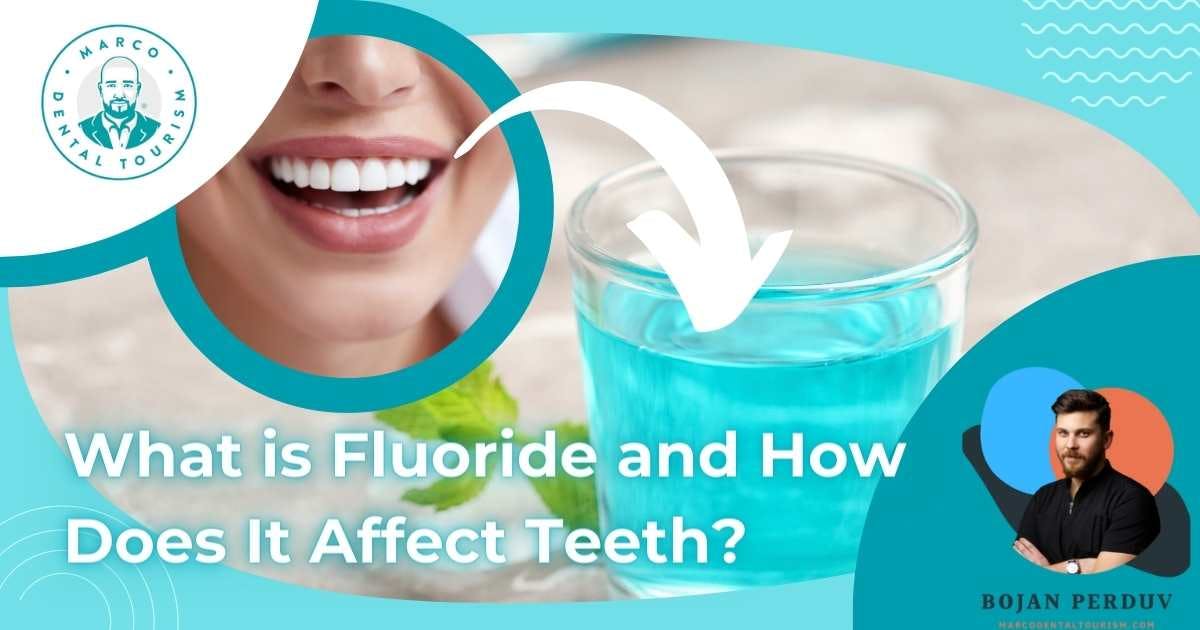What is Fluoride and How Does It Affect Teeth?

In this blog, we explore what dental fluoride is, how it works, and all of its benefits to help you make an informed decision about why it's important to include fluoride in your daily dental care routine.
What is fluoride and how does it affect the teeth?

Fluoride is a natural mineral that in small amounts strengthens enamel and helps protect against caries. It works by remineralizing weakened enamel, making it more resistant to acid attacks in the mouth. It can also disrupt the metabolism of plaque bacteria, reducing their ability to produce acid.
How does fluoride prevent caries?
Fluoride prevents tooth decay by strengthening tooth enamel, making it more resistant to acid attack by bacteria in plaque. When fluoride is present in the mouth, it is incorporated into the crystalline structure of enamel, making it more resistant to demineralization. This results in a reduced amount of tooth decay in the mouth.
What are the benefits of fluoride?

The benefits of fluoride consist in strengthening tooth enamel and remineralizing parts of the teeth that have already begun to decay. In addition, fluoride can be helpful for people with sensitive teeth by reducing the sensitivity of the nerve endings in the teeth. Other benefits of fluoride include:
- Preventing tooth decay: Fluoride helps prevent tooth decay by making teeth more resistant to acid attacks caused by plaque bacteria and sugar buildup in the mouth.
- Strengthens teeth: Fluoride can help strengthen teeth by restoring weakened tooth enamel, making teeth more resistant to decay and damage.
- Reliability and Effectiveness of Use: Fluoride is proven safe and effective in preventing tooth decay when used in appropriate amounts recommended by qualified dentists.
- Availability in a variety of forms: Fluoride is available in a variety of forms, including toothpaste, mouthwash, and professional dental office treatments, making it easy to incorporate into your daily oral care routine.
- Cost-effectiveness: The use of fluoride is very cost-effective because its regular use helps prevent the need for more expensive dental treatments such as fillings, crowns, and root canal treatment.
What is dental fluoridation?

Dental fluoridation is the process of applying fluoride to the teeth to prevent caries. This is a common practice in dental offices and involves the use of fluoride varnish or gel that is applied to the teeth using a special brush. Fluoride strengthens tooth enamel, making it more resistant to caries.
Should you use toothpaste with fluoride?

Yes, you should use fluoride toothpaste. Fluoride helps remineralize tooth enamel, making it more resistant to tooth decay caused by plaque and acid. However, for optimal dental health, it is important to use the correct amount of toothpaste and follow a proper oral hygiene routine.
How much fluoride should be in toothpaste?
The recommended level of fluoride in toothpaste indicated on the product packaging is between 1,000 and 1,500 ppm fluoride. It is important to use a pea-sized amount of toothpaste for adults and to supervise children under the age of six to make sure they do not swallow the toothpaste.
Can excessive use of fluoride be harmful?
Excessive use of fluoride can be harmful to health. A higher amount of fluoride can cause dental fluorosis - a condition that causes white or brown spots on the teeth. It is important to follow the instructions and to consult a dentist if you have any doubts about its use.
What is water fluoridation?

Fluoridation is the process of adding fluoride to water pipes in order to reduce caries in the population. Fluoridation is widely accepted in many countries and is considered a safe and effective measure of public health because numerous studies have shown that a precisely determined amount of fluoride in water has a preventive effect.
What are the advantages and disadvantages of water fluoridation?
Water fluoridation can help prevent tooth decay and is a cost-effective public health measure. However, excessive fluoride intake can lead to dental fluorosis and other health problems in humans. That is why it is very important to precisely determine the potential benefits and risks before implementing a fluoridation program.
What foods contain fluoride?
Fluoride can be found in a variety of foods, including tea, fish, seaweed, and some vegetables such as spinach and kale. However, the levels of fluoride in these foods are generally low, so the primary sources of fluoride are fluoridated water or dental products that contain fluoride such as toothpaste or toothpaste.
How is tooth demineralization treated in children?

Mild cases of demineralization in children can often be treated with fluoride supplements, while more advanced cases may require professional treatments such as dental fillings. It is important to maintain good oral hygiene and visit the dentist regularly to prevent demineralization of children's teeth.
When should you use fluoride-free toothpaste?
Fluoride-free paste is intended for people who prefer natural and organic products, as well as for those who have allergies or hypersensitivity to fluoride. Also, children under the age of six should use fluoride-free toothpaste due to the risk of swallowing the paste or the appearance of fluoro-white stains on the teeth.
Our conclusion

To conclude, dental fluoride is a powerful tool in the fight against caries, and if used according to the instructions, its advantages can be numerous. In addition to being proven to strengthen tooth enamel, prevent decay, and even reverse early signs of tooth decay, fluoride can help us fully preserve our healthy teeth and gums. If you have any doubts about the amount of fluoride allowed and how to use it for yourself and your family, schedule a regular check-up with your dentist and remove any doubt.













Share your opinion!
What do you think about this topic?
Comments (0)